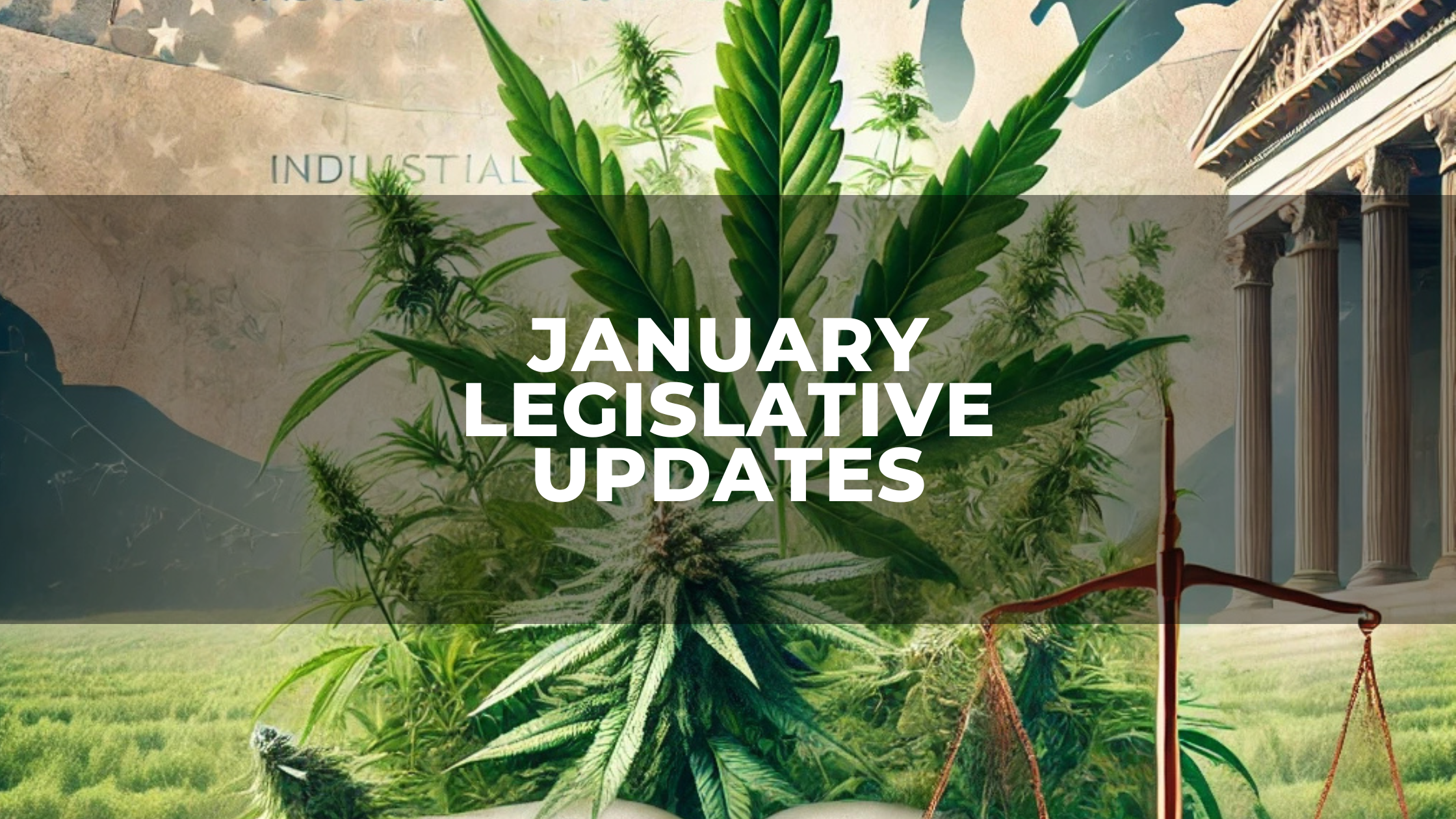
January Hemp Legislation Updates
In January 2025, several states introduced and advanced new legislation addressing hemp and industrial hemp industries. These bills cover regulatory updates, labeling, licensing, sales restrictions, and innovative initiatives. Here’s a comprehensive overview of key proposals and developments across the United States.
Hemp Legislation Updates
Connecticut (Bill SB 970)
- Summary: A proposal to expand the scope of products sold in cannabis retail establishments by allowing hemp and cannabidiol (CBD) products.
- Objective: This integration targets better access and market opportunities without amending medical marijuana laws.
Hawaii (Bill HB 1108 and SB 620)
-
Key Measures:
- Establishment of a state-funded hemp manufacturing facility.
- Hemp processors must provide updated information to the Department of Health (DOH) within 60 days after significant events.
- Prohibition on selling hemp biomass directly to consumers.
- Imposition of new labeling and packaging standards for consumable hemp products.
Industrial Hemp Legislation Updates
California (Bill AB 8)
-
Primary Changes:
- Out-of-state hemp manufacturers producing food, beverage, or cosmetic products for sale in California must now register with the State Department of Public Health.
- Ensures compliance with the Medicinal and Adult-Use Cannabis Regulation and Safety Act (MAUCRSA) for licensees dealing with industrial hemp products.
Oregon (Bill SB 556)
-
Proposal Highlights:
- Introduces a motion detection security system requirement for licensed marijuana businesses.
- The Oregon Liquor and Cannabis Commission (OLCC) is authorized to create industrial hemp endorsements for marijuana producers.
- Enables digital transportation manifests for industrial hemp commerce, paving the way for potential interstate trade.
Hawaii (Bill HB 1185)
-
Plant-Based Building Materials Initiative:
- Establishes a working group at the University of Hawaii to study the feasibility of growing plants such as hemp for sustainable construction materials.
- This initiative aims to foster green job creation and reduce carbon emissions.
Consumer Protection and Sales Restrictions
Virginia (Bill HB 1946)
-
Prohibition Measures:
- Prevents individuals under 21 from purchasing, possessing, or using hemp products intended for smoking.
- Violations are deemed contraband offenses with provisions for educational courses upon repeated violations.
Hawaii (Bill SB 1428)
-
Sales Restrictions:
- Sets a minimum age for purchasing manufactured hemp products.
- Introduces mandatory registration for hemp retailers and distributors, requiring DOH oversight through application fees and certificate issuance.
Economic Impact and Research Proposals
Connecticut (Bill HB 6782)
-
Study Focus:
- Examines the economic benefits of creating a federally subsidized industrial hemp program.
Green Building and Tax Incentives
Hawaii (Bill SB 620)
-
Tax Credit Implementation:
- Provides tax credits for constructing buildings using at least 30% locally-grown hemp materials.
- Updates packaging and sales conditions for hemp-based edible and beverage products.
FAQs on New Hemp Regulations
1. What are the new labeling requirements for hemp products in Hawaii?
The new bills mandate stricter labeling standards to enhance consumer protection, ensuring accurate THC concentration disclosure and child-resistant packaging.
2. How does Connecticut's SB 970 impact cannabis retail stores?
SB 970 allows these stores to expand their product offerings to include CBD and other hemp-based products, broadening consumer access to health and wellness items.
3. What’s the significance of California's industrial hemp registration requirement?
California’s AB 8 ensures that all manufacturers selling hemp-based food and cosmetics are registered with the state to maintain product safety and legal compliance.
4. What measures are being taken to prevent underage access to hemp products?
Several states, including Virginia and Hawaii, have imposed age restrictions and penalties for underage possession of hemp products.
5. Are there any tax incentives for using hemp materials in construction?
Yes, Hawaii's proposed tax credit encourages sustainable construction by rewarding builders who use locally-sourced hemp.
6. Will the Oregon bill (SB 556) affect interstate hemp commerce?
The bill includes provisions for industrial hemp trade across state lines if federal laws permit, which could significantly enhance market opportunities for Oregon producers.
Conclusion
With these new bills, 2025 is shaping up to be a pivotal year for the hemp industry. The focus on regulatory clarity, sustainable practices, and consumer protection signals ongoing growth and innovation in this sector. Stay updated with American Healthy Alternatives Association by visiting myhealthyusa.org for future legislative reports and industry insights.



